Unveil 13 PPC strategies perfected for local business owners. From keyword research to performance analytics, elevate your lead generation game with actionable insights.
Pay-Per-Click, often abbreviated as PPC, is a digital advertising strategy that enables businesses to promote their products and services online with the goal of generating leads.
Its effectiveness has been thoroughly discussed in a research by R. Bhandari published on the Semantic Scholar website on March 30th, 2018.
PPC ads are displayed on various platforms, and advertisers only pay when users click on their ads, making it a cost-effective advertising method.
In the context of local businesses, PPC can be a powerful tool for lead generation, as it allows businesses to target specific geographical areas and reach potential customers within their local community.
In this article we delve into 13 essential PPC strategies tailored for local businesses, shedding light on how to harness the full potential of PPC advertising to generate valuable local leads.
Contents
- Top Ad Networks for Local Lead Generation
- Importance of PPC for Local Lead Generation
- 1. Dive into Keyword Research
- 2. Mastering Geotargeting
- 3. Enhance with Ad Extensions
- 4. Optimize Your Landing Pages
- 5. Crafting Stellar Ad Copywriting
- 6. Smart Ad Scheduling
- 7. Efficient Budget Management
- 8. Fine-tune with Bid Strategy Optimization
- 9. Emphasizing Mobile Optimization
- 10. Perfect Ads with A/B Testing
- 11. Re-engage with Remarketing
- 12. Elevate with Quality Score Management
- 13. Delve into Performance Analytics
- Alternatives to Google Ads and Bing Ads
- Tools for Local PPC Campaign Management
- Cost Analysis of Local PPC Campaigns
Top Ad Networks for Local Lead Generation

When it comes to local lead generation through PPC advertising, several ad networks stand out as effective platforms for reaching local audiences.
Associated with PPC, there’s SEA (Search Engine Advertising), which is a form of paid marketing that allows businesses to place their ads at the top of search engine results pages (SERPs).
Listed below are the top 7 SEA platforms for local lead generation.
- Google Ads: Offers geotargeting capabilities and widespread reach, ideal for connecting with local prospects.
- Facebook Ads: Allows location and interest-based targeting, perfect for local businesses wanting to engage with their communities.
- Bing Ads: Sometimes overlooked but with a significant user base, it can be a valuable channel for local lead generation.
- Yelp Ads: Yelp Ads boosts local businesses' visibility to nearby customers actively searching on the platform, enhancing local lead generation.
- Nextdoor Ads: Nextdoor Ads allows businesses to target local neighborhoods, boosting visibility and generating nearby leads.
- DuckDuckGo Advertising: Privacy-focused advertising platform, offering a niche yet valuable audience for local advertisers.
- Amazon Ads: Provides access to a vast audience of shoppers, potentially beneficial for local businesses selling products online.
Check out our article on the best ad networks to generate local leads to learn more about the platforms mentioned above.
Local PPC vs. General PPC Campaigns
In the table below you can see the differences between local and general PPC campaigns.
| Aspect | Local PPC | General PPC |
|---|---|---|
| Geographical Targeting | Focuses on specific geographic areas, optimizing for a nearby audience. | Targets a wide area which may include various regions, countries, or globally. |
| Design Purpose | Aimed at audiences actively seeking local services/products, and highly likely to convert. | Can target broad audiences, often focused on brand exposure, website traffic, or online conversions. |
| Ad Customization | Ad copy, keywords, and extensions are specifically tailored to local searches. | Ad components are typically more generalized and not location-specific. |
| Outcome/Objective | Seeks to drive foot traffic, local leads, and conversions from nearby prospects. | May aim for broader objectives like global visibility, online conversions, and wide-ranging leads. |
Importance of PPC for Local Lead Generation

PPC is indispensable for local business owners in their quest for leads due to its unparalleled ability to attract local clientele effectively.
In today's digital age, where consumers frequently turn to search engines for local services and products, PPC campaigns allow businesses to position themselves prominently in search results.
By harnessing targeted keywords and geographical parameters, PPC ads ensure that local prospects in need of specific services or products are presented with tailored offers.
This not only drives highly relevant traffic to a business's website but also increases the likelihood of lead generation.
The pay-per-click model further adds to its appeal, as local businesses can closely monitor their ROI and allocate budgets efficiently, making PPC a powerful tool for generating leads within a specific geographical radius.
Benefits
Listed below are 7 benefits of PPC for local businesses.
- Precise Geographical Targeting: PPC allows businesses to target potential customers in specific locations, enhancing local lead generation.
- Reaching an Active Audience: Ads are displayed to users who are actively seeking local services or products, boosting conversion opportunities.
- Cost-Effective Marketing: Since businesses only pay per click, PPC can be a budget-friendly advertising option.
- Immediate Results: PPC campaigns can deliver instant outcomes, beneficial for timely marketing efforts.
- Real-Time Adjustments: The ability to modify campaigns on-the-go ensures that marketing efforts can be maximized efficiently.
- Insightful Analytics: PPC provides crucial data about customer behavior, enabling strategy refinement for optimized lead generation.
- Enhanced Connection with the Target Audience: Local businesses can effectively connect with their community, driving conversions and expanding their customer base through targeted PPC campaigns.
Drawbacks
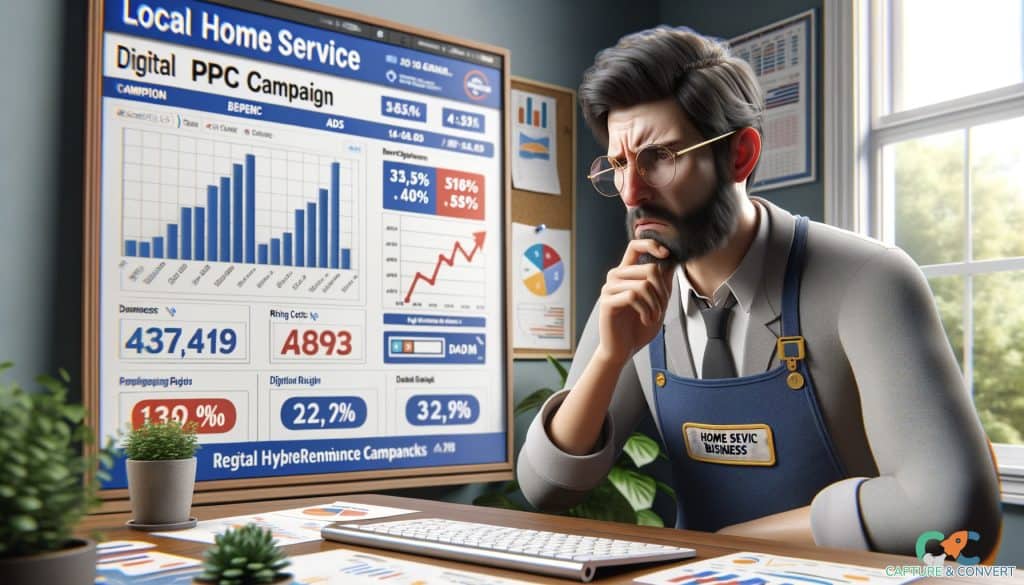
Listed below are 5 drawbacks of PPC for local businesses.
- Cost Concerns: Competitive keywords and high-demand locations can elevate bidding prices, potentially increasing advertising expenses.
- Time-Consuming Management: Managing a PPC campaign, especially for businesses with limited resources or expertise, can be time and resource-intensive.
- Potential for Mismanagement: Improper management of campaigns may lead to inefficient use of ad spend.
- Ad Fatigue/Banner Blindness: Users may become desensitized to ads over time, reducing their effectiveness.
- Lack of Long-Term Presence: PPC does not contribute to a sustained organic online presence, as visibility may drop once campaigns end.
Considering these drawbacks is vital for developing a balanced and successful local PPC strategy.
Listed below are 13 essential PPC strategies for local business lead generation.
- Dive into Keyword Research
- Mastering Geotargeting
- Enhance with Ad Extensions
- Optimize Your Landing Pages
- Crafting Stellar Ad Copywriting
- Smart Ad Scheduling
- Efficient Budget Management
- Fine-tune with Bid Strategy Optimization
- Emphasizing Mobile Optimization
- Perfect Ads with A/B Testing
- Re-engage with Remarketing
- Elevate with Quality Score Management
- Delve into Performance Analytics
1. Dive into Keyword Research

Keyword research is the foundation of a successful local PPC campaign.
Finding effective keywords involves identifying the specific search terms and phrases that potential customers in your local area are using when looking for products or services like yours.
Effective keyword research can make or break your PPC efforts, ensuring that your ads are seen by the right people at the right time.
The following list explains what’s required to excel in local PPC keyword research.
- Start With a List of Relevant Keywords: Brainstorm a list of keywords related to your business and location.
- Use Keyword Research Tools: Tools like Google Keyword Planner, SEMrush, or Moz can help you discover additional keywords and estimate their search volume.
- Analyze Competitor Keywords: Examine what keywords your competitors are targeting and consider incorporating them into your strategy.
- Focus on Long-Tail Keywords: These longer and more specific keyword phrases can attract highly relevant local traffic.
- Prioritize High-Intent Keywords: Look for keywords that indicate strong purchase intent, such as "near me" or "buy now."
2. Mastering Geotargeting

Mastering geotargeting in your local PPC campaigns is a surefire way to enhance your advertising efforts.
By accurately reaching your local audience, optimizing your ad content, and using location-specific keywords, you can significantly improve your campaign's performance.
The following list contains 5 actionable strategies to excel in geotargeting.
- Define Your Target Area: Clearly outline the geographical regions where your potential customers are located, whether it's a specific city, neighborhood, or radius around your physical store.
- Use Location-Specific Keywords: Incorporate location-based keywords into your ad campaigns to align with users' search intent, such as "New York plumber" or "Seattle pizza delivery."
- Customize Ad Copy and Extensions: Tailor your ad content to reflect the local area you're targeting, including location-specific offers and references.
- Set Bid Adjustments: Adjust your bids based on the performance of specific locations. Allocate higher budgets to areas with higher conversion rates.
- Leverage Location Extensions: Use Google Ads' location extensions to display your address and contact information, making it easier for nearby customers to find and contact you.
3. Enhance with Ad Extensions

Leveraging ad extensions is a powerful strategy to elevate the visibility and effectiveness of your PPC ads.
Ad extensions provide additional information and interactive elements that entice users to engage with your ads and take action.
By incorporating various ad extensions tailored to your specific goals and audience, you can not only increase your ad's appeal but also improve click-through rates, boost conversions, and enhance your overall PPC campaign performance.
The following list provides 5 actionable tips for enhancing your PPC ads with ad extensions.
- Utilize Sitelink Extensions: Direct users to specific pages on your website, such as product categories or service offerings.
- Incorporate Callout Extensions: Highlight key benefits, features, or promotions to make your ad stand out.
- Implement Structured Snippet Extensions: Showcase additional information about your products, services, or business categories.
- Utilize Location Extensions: Display your business address and a map, making it easy for local customers to find you.
- Leverage Call Extensions: Encourage direct phone calls to your business, which can be particularly valuable for local lead generation.
4. Optimize Your Landing Pages
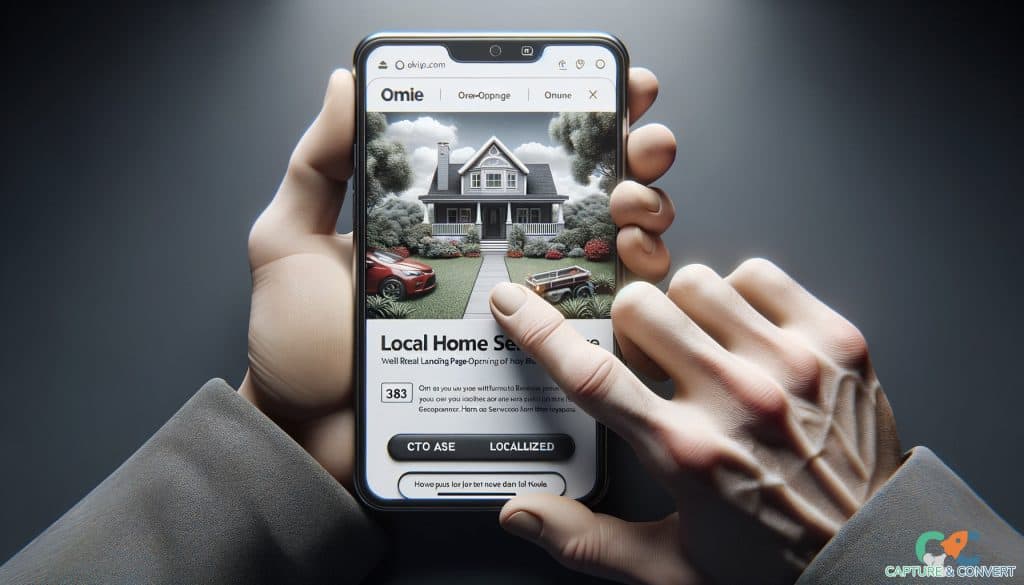
Optimizing your landing pages is crucial to ensuring the success of your local PPC campaigns.
These dedicated pages are where potential customers land after clicking on your ads, making them the final frontier in converting clicks into valuable leads.
The following list presents 7 actionable strategies to make the most of your landing pages.
- Align with Ad Messaging: Ensure that your landing page content closely matches the message and intent conveyed in your PPC ads.
- Mobile Optimization: Make your landing pages mobile-friendly to cater to users on various devices.
- Clear Call to Action (CTA): Feature a prominent CTA button that directs visitors to take the desired action, such as making a call or filling out a contact form.
- Loading Speed: Optimize page loading times for a seamless user experience.
- Localized Content: If applicable, include content that speaks directly to your local audience, highlighting your business's relevance to their needs.
- Trust Signals: Display trust-building elements like customer reviews, testimonials, security badges, and privacy policies.
- A/B Testing: Continuously test and refine your landing pages to improve conversion rates.
5. Crafting Stellar Ad Copywriting
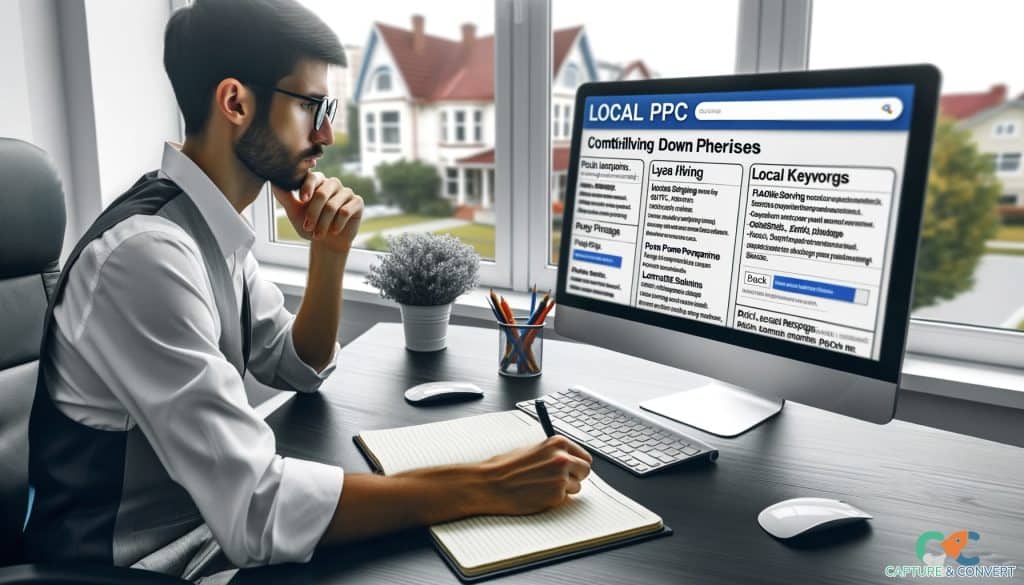
Ad copywriting is the process of writing persuasive text for advertisements.
Crafting compelling ad copy is essential for capturing the attention of your local target audience and enticing them to click on your PPC ads.
Effective ad copy should resonate with the local community, addressing their specific needs and preferences.
The following list provides 5 actionable techniques to help you craft stellar ad copy for your local PPC campaigns.
- Local Keywords: Incorporate relevant local keywords into your ad copy to enhance its local appeal.
- Highlight Benefits: Emphasize how your products or services can directly benefit local customers.
- Use Local Language: Speak the language of your local audience, using phrases and expressions that resonate with them.
- Include Local Numbers: Incorporate local phone numbers to establish a local presence and boost trust.
- Highlight Local Awards or Recognitions: If your business has received local awards or recognition, feature them in your ad copy to enhance credibility.
6. Smart Ad Scheduling

Strategic ad scheduling is a crucial aspect of successful local PPC campaigns, as it enables businesses to deliver their ads when their local audience is most active and likely to engage.
Timing your ads effectively can significantly enhance their impact and reach within your target location.
The following list contains 5 actionable tips for smart ad scheduling in your local PPC campaigns.
- Analyze Audience Behavior: Use data and insights to understand when your local audience is most active online.
- Leverage Dayparting: Adjust your ad scheduling based on the day of the week and time of day to align with peak engagement periods.
- Consider Time Zones: If your business serves multiple time zones, ensure your ad scheduling reflects the local time of each target area.
- Utilize Ad Scheduling Tools: Many PPC platforms offer scheduling features that allow you to automate ad delivery during specific timeframes.
- Regularly Monitor Performance: Continuously analyze your ad scheduling results to refine and optimize the timing for better outcomes.
7. Efficient Budget Management
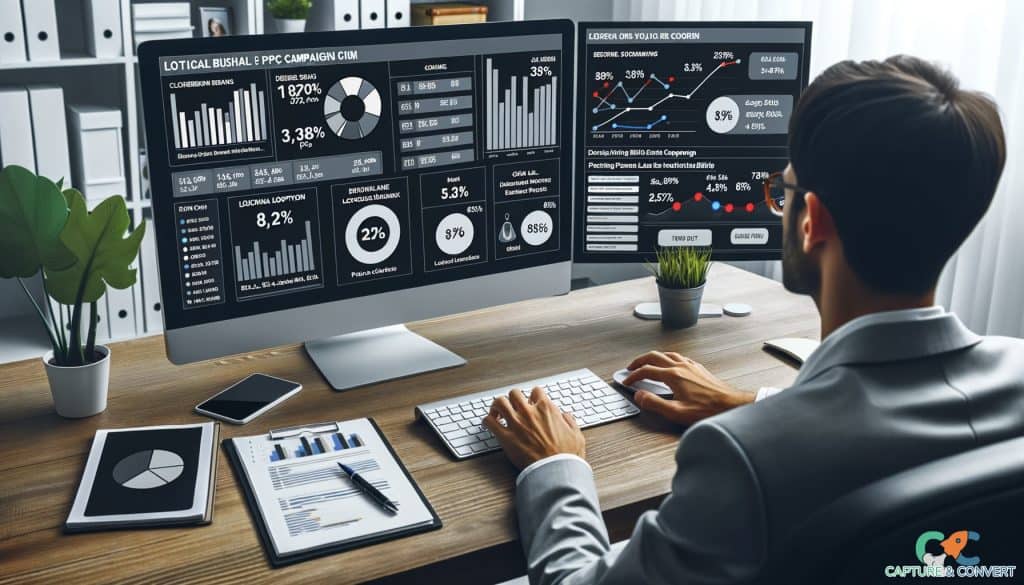
Effective budget management is a cornerstone of successful local PPC campaigns, ensuring that you get the most out of your advertising spend while generating valuable local leads.
By efficiently allocating and controlling your budget, you can maximize your return on investment (ROI) and achieve your lead generation goals.
The following list provides 5 tips for correct and efficient budgeting.
- Set Clear Budget Objectives: Define your PPC budget goals, whether it's focused on lead volume, conversion rates, or cost per acquisition (CPA).
- Allocate by Location: If you have multiple locations, allocate your budget based on the importance and potential of each local area.
- Use Bid Adjustments: Adjust your bids based on the performance of different locations or timeframes to optimize your budget allocation.
- Implement Ad Scheduling: Align your budget with your ad scheduling to ensure your ads run during peak local audience engagement times.
- Regularly Monitor and Adjust: Continuously track your budget's performance and make adjustments to allocate funds to the highest-performing campaigns and keywords.
8. Fine-tune with Bid Strategy Optimization

Bid strategy optimization plays a crucial role in the success of your local PPC campaigns.
Bidding it's the art of finding the right balance between your bid amounts, keywords, and audience targeting to ensure you get the best value for your ad spend while generating high-quality local leads.
The following list provides 5 actionable tips for fine-tuning your bid strategy in local PPC.
- Keyword-Level Bidding: Analyze the performance of individual keywords and adjust your bids accordingly. Allocate more budget to high-performing keywords and reduce spending on underperforming ones.
- Location Bid Adjustments: Use geotargeting to adjust your bids based on the location's importance and competitiveness. Bid higher in areas with high lead potential and lower in less critical regions.
- Dayparting: Optimize your bid strategy based on the time of day or day of the week when your local audience is most active. Increase bids during peak hours to maximize visibility.
- Device Targeting: Tailor your bids for different devices (desktop, mobile, tablet) based on performance metrics and user behavior on each platform.
- Ad Schedule Adjustments: Align bid adjustments with your ad scheduling to ensure your ads are more competitive when they matter most to your local audience.
9. Emphasizing Mobile Optimization
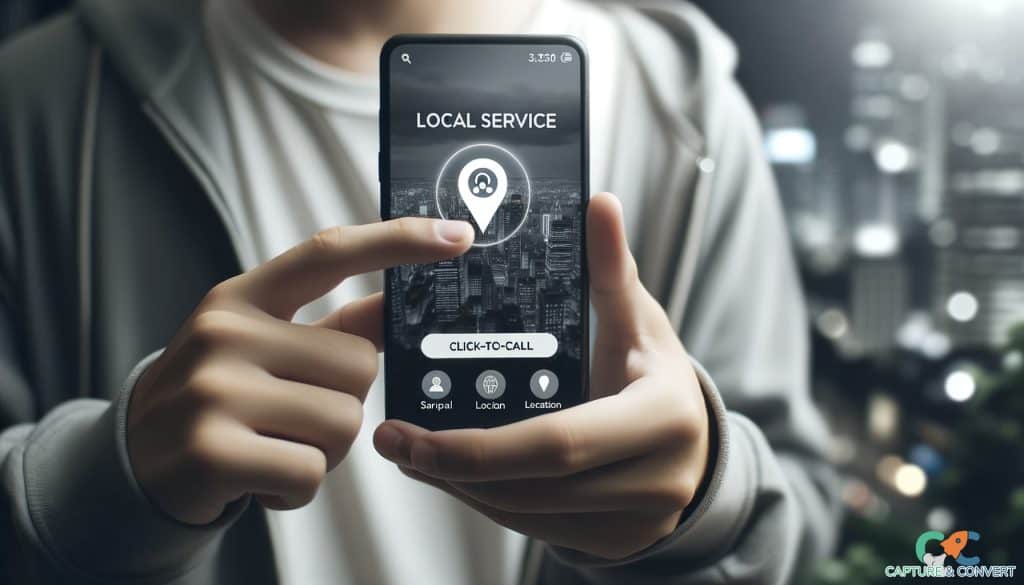
Mobile optimization is no longer optional in the world of PPC advertising; it's a necessity.
With an increasing number of users accessing the internet and local information via mobile devices, your local PPC campaigns must cater to this audience effectively.
The following list provides 10 practical tips for emphasizing mobile optimization in your campaigns.
- Mobile-Friendly Landing Pages: Ensure your landing pages are mobile-responsive and load quickly on smartphones. Optimize the user experience by simplifying navigation and minimizing form fields.
- Click-to-Call Extensions: Implement click-to-call extensions in your ads to make it easy for mobile users to contact your business directly from the ad.
- Local Extensions: Use location extensions to display your business address prominently in mobile ads, making it simple for users to find your physical location.
- Ad Copy Tailored for Mobile: Craft ad copy that resonates with mobile users and encourages action. Highlight the benefits of your products or services and include compelling calls to action.
- Mobile-Specific Keywords: Identify and target mobile-specific keywords that mobile users are likely to search for. Adjust your bid strategy for these keywords to reach a mobile audience effectively.
- Mobile App Promotion: If you have a mobile app, promote it through your PPC campaigns. Use app extensions and app install ads to encourage downloads.
- Fast-Loading Ads: Ensure your ad creatives and landing pages load quickly on mobile devices. Slow-loading pages can lead to high bounce rates and missed opportunities.
- Monitor Mobile Performance: Regularly review your campaign performance data to identify trends and areas for improvement specific to mobile users.
- Optimize for Local Searches: Localize your keywords and ad content to capture mobile users searching for nearby businesses or services.
- Responsive Design: If you're running display ads, make sure they have responsive designs that adapt to different screen sizes and orientations.
10. Perfect Ads with A/B Testing

A/B testing is a valuable tool in your local PPC arsenal, allowing you to fine-tune ad elements for maximum performance.
By conducting controlled experiments, you can gather data-driven insights into what works best for your local audience.
The following list provides 11 actionable tips for perfecting your ads with A/B testing.
- Test Different Ad Copy: Experiment with variations in ad headlines, descriptions, and calls to action. Discover which messaging resonates most with your local audience and encourages click-throughs.
- Try Various Ad Formats: Test different ad formats, such as text ads, image ads, and video ads, to determine which ones engage your local audience most effectively.
- Experiment with Ad Extensions: A/B test various ad extensions to see which ones boost your ad's visibility and click-through rate. This might include site link extensions, callout extensions, or structured snippet extensions.
- Optimize Landing Pages: Test different landing page layouts, content, and forms to find the combinations that drive the most conversions from your local audience.
- Play with Ad Position: Adjust your ad's position within the search results to see if higher or lower positions yield better results for your local lead generation goals.
- Split Test Keywords: Experiment with different keyword variations within your ad groups to understand which keywords perform best for local searches.
- Explore Bidding Strategies: Test different bidding strategies, such as manual bidding or automated bidding, to determine which strategy aligns with your local PPC goals.
- Monitor Ad Schedule: Assess how different ad scheduling times impact your local ad performance. Adjust ad schedules based on when your local audience is most active.
- Geographic Targeting: Test the effectiveness of geographic targeting by running ads in different locations within your target area. Identify high-performing regions and allocate budget accordingly.
- Creative Elements: Evaluate the impact of ad creative elements like images, colors, fonts, and branding on click-through rates and conversions.
- Device-Specific Testing: Explore how your ads perform on different devices (desktop, mobile, tablet) and optimize them accordingly.
11. Re-engage with Remarketing
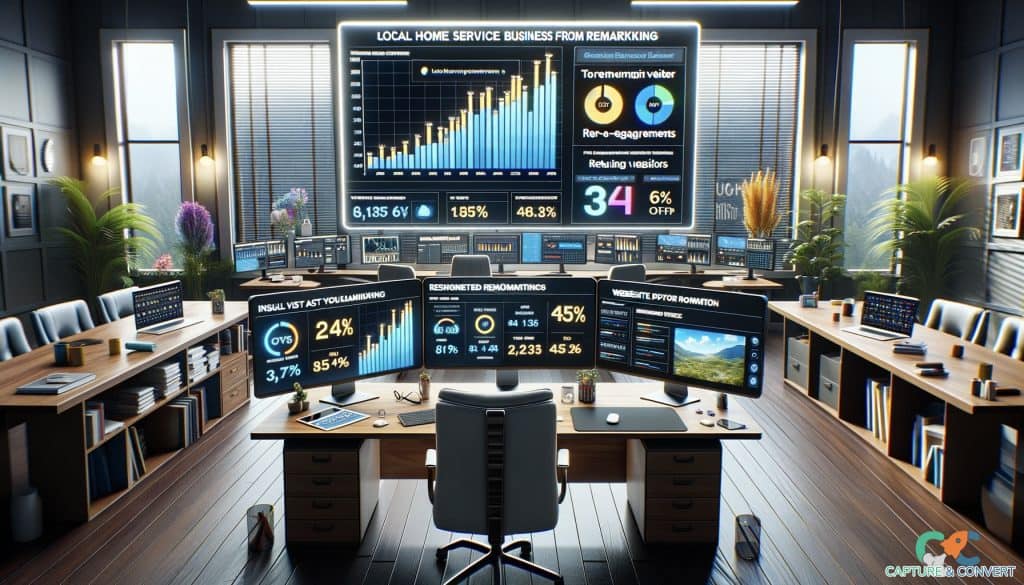
Remarketing is a powerful strategy to re-engage potential leads who have previously interacted with your brand but didn't convert.
It helps increase campaign efficiency by targeting a warmer audience.
The following list contains 11 tips for effectively implementing remarketing in your local PPC campaigns.
- Tailor Ad Messaging: Craft personalized ad messages based on the specific actions users took on your website. For example, if someone viewed a product page but didn't make a purchase, you can create tailored ads showcasing that product.
- Segment Audiences: Segment your audience based on their behavior and interests. Create separate remarketing lists for users who visited different sections of your site, allowing you to deliver highly relevant ads.
- Exclude Converters: Exclude individuals who have already converted or completed your desired action from your remarketing campaigns. Focus your budget on users who haven't yet taken the desired action.
- Set Frequency Caps: Avoid bombarding users with excessive ads. Set frequency caps to control how often your remarketing ads are shown to prevent ad fatigue.
- Leverage Dynamic Remarketing: Utilize dynamic remarketing to automatically show users the exact products or services they previously viewed on your site, increasing relevancy and the likelihood of conversion.
- Create Compelling Creatives: Design visually appealing and attention-grabbing ad creatives that encourage users to revisit your site and complete their intended action.
- Optimize Landing Pages: Ensure that the landing pages users are directed to are relevant to the ad they clicked. A consistent message and user experience can significantly boost conversion rates.
- Test Ad Copy and Imagery: A/B test ad copy, headlines, and imagery to determine which combinations resonate best with your remarketing audience.
- Utilize Time-Based Lists: Create lists based on how recently users interacted with your site. Tailor your messaging for users who recently visited versus those who engaged a while ago.
- Promote Special Offers: Highlight special promotions, discounts, or exclusive deals in your remarketing ads to entice users to return and convert.
- Monitor and Adjust: Continuously monitor the performance of your remarketing campaigns. Adjust bidding, messaging, and targeting based on what drives the best results for local lead generation.
12. Elevate with Quality Score Management
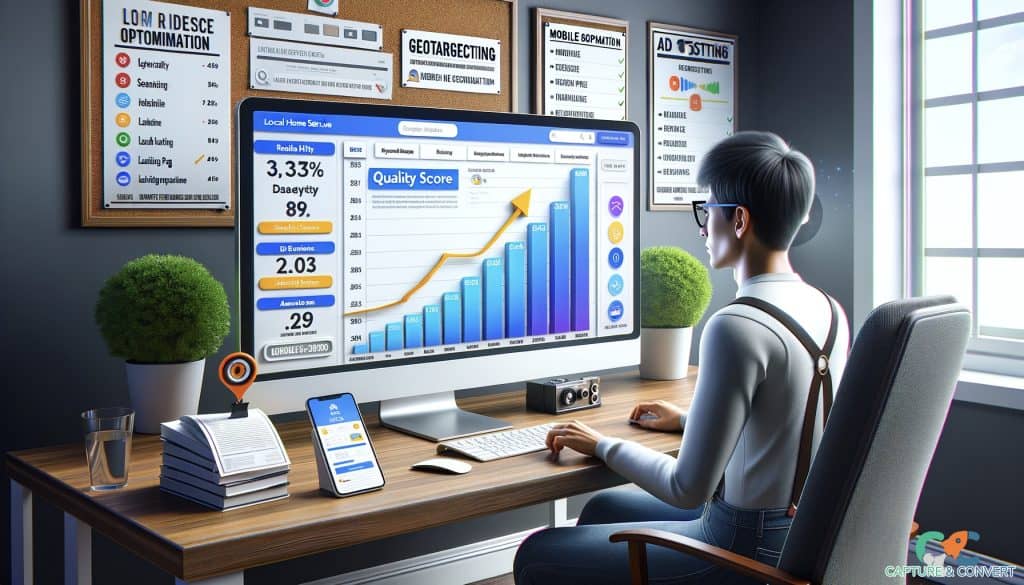
Quality Score management is crucial for the success of your PPC campaigns.
It directly impacts your ad's visibility, ad placements, and the costs associated with them.
The following list contains 12 tips to elevate your Quality Score and improve your local lead generation efforts.
- Keyword Relevance: Ensure that your keywords are highly relevant to your ad copy and landing pages. The closer the alignment, the better your Quality Score.
- High-Quality Landing Pages: Create landing pages that offer a seamless user experience, load quickly, and provide valuable content related to your ads.
- Ad Relevance: Craft ad copy that directly relates to the user's search intent. Use relevant keywords in your ad headlines and descriptions.
- Optimize for Click-Through Rate (CTR): Improve your ad's CTR by creating compelling ad copy and using ad extensions like site links and callouts to enhance the visibility and appeal of your ads.
- Negative Keywords: Utilize negative keywords to filter out irrelevant traffic and ensure your ads are shown to the most qualified audience.
- Ad Extensions: Take advantage of ad extensions to provide additional information and value to users, which can boost your ad's relevance and CTR.
- Mobile Optimization: Ensure your ads are well-optimized for mobile devices, as Google considers the mobile experience in Quality Score calculations.
- Regular Review: Continuously monitor and optimize your PPC campaigns. Remove underperforming keywords, improve ad copy, and refine landing pages based on data-driven insights.
- Landing Page Experience: Focus on delivering an excellent landing page experience by maintaining fast load times, clear navigation, and relevant content.
- Ad Testing: Run A/B tests on your ad variations to identify the most effective ad copy, headlines, and imagery that resonate with your audience.
- Geotargeting: Tailor your ads to specific locations and audiences to improve relevance and increase the chances of user engagement.
- Ad Positioning: Aim for higher ad positions within the search results, as this can positively impact your Quality Score and CTR.
13. Delve into Performance Analytics

Delving into performance analytics is essential in the ever-evolving realm of PPC advertising.
By examining the performance analytics of a campaign, you gain valuable insights that allow you to optimize your strategies for better results.
The following list shows 13 tips on how you can effectively use performance analytics to enhance your local business lead generation through PPC.
- Conversion Tracking: Set up conversion tracking to measure the actions that matter most to your business, whether it's form submissions, phone calls, or e-commerce purchases.
- Click-Through Rate (CTR): Monitor your CTR to assess the effectiveness of your ad copy and relevance to your audience. A higher CTR often correlates with better ad performance.
- Quality Score: Keep a close eye on your Quality Score as it directly influences ad rankings and costs. Use the data to refine keywords, ad copy, and landing pages.
- Keyword Performance: Identify top-performing keywords and allocate more budget to them. Conversely, pause or adjust bids for underperforming keywords.
- Ad Position: Evaluate the impact of ad positioning on your campaign performance. Adjust bids and ad strategies to secure higher placements if it aligns with your goals.
- Audience Insights: Analyze demographic and geographic data to understand your audience better. Tailor your campaigns to cater to the preferences and behavior of your local audience.
- Ad Schedule Analysis: Review the times and days when your ads perform best. Adjust your ad scheduling to maximize visibility during peak periods.
- Device Targeting: Assess performance across different devices (desktop, mobile, tablet) and allocate budget accordingly to prioritize the most profitable device types.
- Competitor Analysis: Monitor your competitors and their strategies. Identify opportunities to outperform them and capture market share.
- Ad Copy Testing: Continuously test different ad variations to discover which messaging resonates best with your local audience.
- Budget Allocation: Optimize your budget allocation based on the performance data of individual campaigns, ad groups, or keywords.
- ROI Analysis: Calculate the return on investment (ROI) for your PPC campaigns to ensure that your advertising spend generates a positive outcome.
- Campaign Optimization: Regularly refine your campaigns based on the insights you gather. Make data-driven adjustments to improve performance and generate more local leads.
Alternatives to Google Ads and Bing Ads

When it comes to PPC advertising, Google Ads and Bing Ads are dominant players, but there are several noteworthy alternatives to consider.
Listed below are 6 alternatives for Google Ads and Bing Ads.
- Facebook Ads: Enables precise targeting based on demographics and interests.
- LinkedIn Ads: Ideal for B2B marketing with a professional audience focus.
- Instagram Ads: Offers a visually-rich platform to connect with engaged audiences.
- YouTube Ads: Provides extensive reach through video advertising.
- Twitter Ads: Allows businesses to engage with a real-time and trend-focused audience.
- Amazon Advertising: Excellent for e-commerce businesses advertising products on a massive online marketplace.
Each of these alternatives has its unique strengths, allowing you to tailor your PPC strategy to your specific business objectives and target audience.
Tools for Local PPC Campaign Management
Local businesses can benefit significantly from utilizing various PPC tools and platforms to streamline and enhance their campaigns.
Listed below are 7 tools to assist local businesses in their PPC campaigns.
- Google Keyword Planner: This is a tool from Google Ads and integrates with Google Analytics for robust campaign planning and tracking.
- SEMrush: A versatile tool for keyword research, competitor analysis, and ad campaign monitoring.
- WordStream: Useful for efficient bid management and PPC campaign optimization.
- Optmyzr: Provides functionalities for managing and optimizing PPC bids.
- Marin Software: Suitable for local businesses needing advanced campaign management features.
- Kenshoo: Offers sophisticated tools for managing multiple PPC campaigns.
- AdEspresso: Simplifies creating, testing, and optimizing Facebook ad campaigns.
Cost Analysis of Local PPC Campaigns

The cost of local PPC campaigns can vary significantly based on several factors, including the competitiveness of the chosen keywords, the location or region being targeted, the ad network used, and the specific goals of the campaign.
Generally, advertisers pay for each click their ads receive, known as Cost Per Click (CPC).
Therefore, the final cost of a local PPC campaign is directly influenced by the CPC of the selected keywords, the daily budget set, and the overall duration of the campaign.
Additionally, factors like ad quality, ad relevance, and ad extensions can impact both CPC and the overall campaign cost.
Outsourcing Local PPC Management
Outsourcing local PPC management to specialized agencies is a common practice among businesses looking to effectively manage and optimize their PPC campaigns.
PPC agencies have the expertise and experience to create and manage local PPC campaigns, ensuring they are targeted, efficient, and yield the desired results.
This approach allows businesses to benefit from the knowledge and resources of professionals while focusing on their core operations.
Alternatives to PPC
There is an effective alternative to PPC for generating local leads, and that is social media advertising.
Social media platforms like Facebook, Instagram, LinkedIn, and Twitter offer robust advertising options that can help businesses connect with their local target audiences.
These platforms allow you to create highly targeted ad campaigns based on location, demographics, interests, and more, making it an excellent choice for local lead generation.
Social media advertising platforms for local lead generation offer various ad formats, including image and video ads, carousel ads, and sponsored posts, allowing businesses to showcase their products or services creatively.
Moreover, social media platforms provide tools to track ad performance, measure conversions, and optimize campaigns for better results.
Combining the power of social media advertising with other local marketing strategies allows businesses to create a comprehensive approach to generate leads and boost their local presence.

